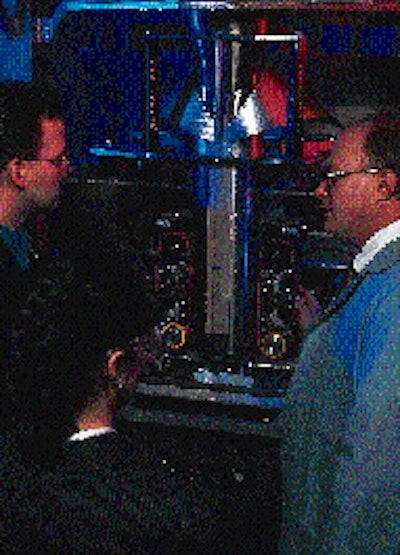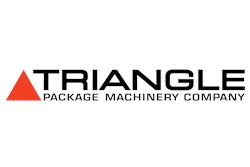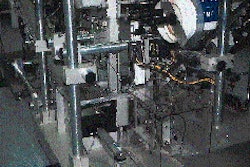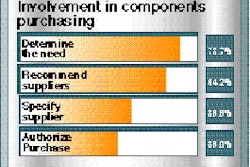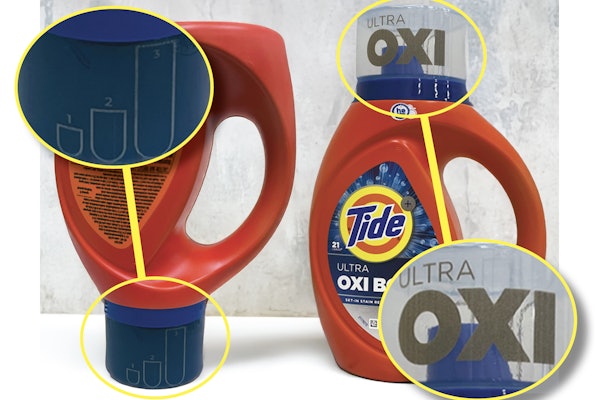A fault light on a control panel flashes red. A machine operator's quick glance tells her that the fill level on nozzle 9 has fallen 0.1 oz short of the acceptable range for six straight fills. Should the machine be shut down for repair, or can an adjustment via the touchscreen of the PLC-controlled filler resolve the problem? The operator opts for the latter course and finds the problem is solved easily enough. She then uses the touchscreen to signal a downstream diverter at the case packer to remove the six bottles with wrong fills. She also types in an explanatory note so that the filler operator on the next shift will be aware of the possible need for corrective action, and so that the line's real-time data acquisition system will not only record that the problem occurred but what steps were taken to correct it and who took them. Welcome to the world of the packaging machinery operator in the year 2000. Fast disappearing are the days when the operator could afford to focus only on the single machine for which he or she had responsibility. Today, and increasingly in the future, machines are parts of seamless systems networked together mechanically and electronically. In such an environment, operators will have to be able to communicate clearly with their counterparts in the line, from uncasing to filling to palletizing to the warehouse itself. Employers, too, will have to communicate more effectively with their employees. At least that's what our interviews of industry experts revealed. Helen Gleason, packaging specialist for Clearwater, FL-based Management Recruiters, is one who sees a trend toward better overall lines of communication between employer and employee. "I see industry changing to more of a coaching type of system, where it's very proactive versus reactive," says Gleason. "I see a process of total involvement of the hourly employee and the salaried employee in the manufacturing operation, a delegation of responsibility to hourly employees to make them feel part of and proud of the manufacturing, as opposed to saying 'This is your job. You do it.' Without an understanding of why they're doing it." As an example of this "total involvement" approach, Gleason cites certain converting companies, a corrugated case maker for example, that encourage their machine operators to visit the customer plant where the case actually gets used. "Very often," says Gleason, "you'll find there's a good interchange of ideas." Operator as stakeholder Gleason's not the only one who believes in the value of making employees believe they are stakeholders in the business. "The best packaging machinery operators will be able to develop a sense of ownership about what they're doing," says a large food company's vice president of packaging, who asked not to be identified. So here's the analogy: Teach a man to make a box and you have a box maker. But teach a man why he's making a box, and you will have a better box maker. Empowering the operator with a sense of self-worth and confidence may be the basis for a proactive employee, one not afraid to share information with fellow employees, and with the confidence to "think on his feet." Mark Niemiec, director of packaging at Camden, NJ-based Campbell Soup Co., elaborates. "The operator will need to know how to work as part of a team. It used to be that the person operating a packaging machine didn't have to be concerned with the warehousing operation, for example. Today and tomorrow, I believe that these things will have to be interconnected. Because if the primary or secondary package doesn't meet performance requirements, it can have a significant impact throughout the warehousing system, both internally and out in the field as the package makes its way to the trade." The confidence of the operator then, is only the beginning. In order to communicate with fellow employees, packaging machinery operators must have an understanding of what their coworkers' jobs entail, as well as having an understanding of the machines they deal with. Jay Hooper, instructor at Guilford Technical College, Jamestown, NC, says he sees the change already in place. "People basically want their employees to know more practical things than ever before," he says. "It used to be enough to have someone who was willing and able to show up so he/she could be trained on the job. Today, companies want a far greater knowledge level. "If I had to quantify," he goes on, "I see about a half a [school] grade increase needed by the industry each year." Bob Testin, Clemson University, Clemson, SC, agrees: "Certainly, by the year 2000, a two-year technical degree or diploma of some kind will be required. It's going to be much more difficult to learn on the fly with these machines now being microprocessor-controlled, much faster, and more sophisticated. The two-year technical schools have a gold mine of opportunity in terms of industry needs." Internships and co-ops were also mentioned in Packaging World's series of interviews as being an important asset to an entry-level employee. Yet some think that it's not a need for more education, but a need to refocus. Says Glenn Davis, director of technical education at Arlington, VA-based Packaging Machinery Manufacturers Institute: "I wouldn't say the knowledge level needed by an operator has gone up. I'd say it's changed. In large part, the change is due to the influx of electronics that now operate and control equipment." The multi-skilled operator While viewpoints vary on how much formal training or education will be required in the future, one thing is for sure: The role of the machine operator is definitely changing. It's clear that the operator's vision must be broader so that he or she can see "the big picture." "Ten years ago, if you could load a cartoner with carton blanks, you were okay," says Bob Geer, director of production at Glaxo Wellcome Pharmaceuticals, Research Triangle Park, NC. "Now and in the future, we'll need operators to know when a piece of equipment isn't quite right and then, rather than immediately calling the mechanic, be able to jump in and fix it." He goes on to mention a concept echoed by a number of people surveyed. "The operator will have to bring in some of the skills of the mechanic." Geer is not alone is his acknowledgement that the duties of mechanic and operator overlap. "If I were running an operation," says Testin of Clemson, "I'd like the operator and mechanic to be interchangeable." Are the two positions melding? Perhaps. Or maybe it's just that as the mechanic becomes more specialized in computer skills and other responsibilities formerly considered the exclusive territory of the packaging engineer, the operator will be-come more specialized in skills traditionally belonging to the mechanic. Training those already hired It's easy enough to hire an entry-level operator with a certificate from a technical college, but how do you improve the knowledge of operators already employed? One answer would be to have them read manuals on new machinery. But as anyone who has purchased a home computer and then tried to plow through the user manuals that come with it can tell you, that's no easy task. Enter the technical writer. Says Robert Woelfling, project design engineer at Hershey Chocolate, Hershey, PA,: "We are currently paying teams of hourly employees to develop training programs for operators and maintenance personnel. Most of their time is spent extracting information from technical manuals and rewriting it in a format that is appropriate for their coworkers." Among the skills cited as crucial are a general electronics knowledge, as well as a call for math skills, so that operators can properly work with statistical process control quality programs. The majority of those asked also said that having computer skills is a growing need now and will be all the more important in the year 2000. "Operators now have to be more sophisticated in the use of controls, PLCs and computers," says PMMI's Davis. "But by the same token, one operator may now be controlling two fast machines in place of formerly being responsible for only one slower machine." Davis and others we interviewed were quick to observe that the menial tasks that operators used to be involved with are disappearing. As these tasks perform their disappearing act, and as more and more automation moves in instead, it will be important for the packaging machinery operators of the future to resist the temptation to view their jobs as being less important than they once were. Sure, it's true that complex changeovers that once took hours are now being accomplished at the touch of a button. But as advances in technology eliminate one set of tasks for which the machine operator traditionally was responsible, that same technology will cause the role of the operator to evolve into something newer and, in a sense, bigger. It will require a broader knowledge of the entire line. It will mean more data management, more troubleshooting, more decision making, more thinking. Upper management had better be ready for these changes, too. Managers will have to be able to stimulate the packaging machinery operator of the future in new ways. Managers will also have to be receptive to ideas percolating up from the plant floor. Otherwise the Suggestion Box will stay empty, and the company's efficiency will suffer. Though much remains unclear, one attribute about the packaging machinery operators of the future seems definite. They cannot afford to be people about whom those immortal words from the movie "Cool Hand Luke" can ever be said: "What we have here is a failure to communicate."
